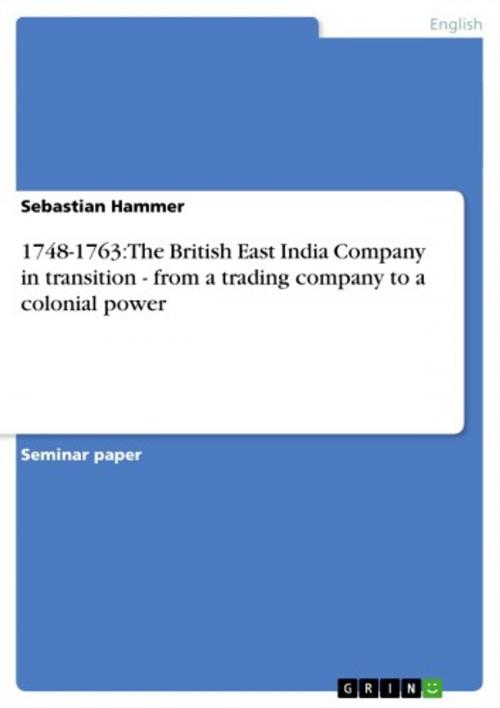1748-1763: The British East India Company in transition - from a trading company to a colonial power
Nonfiction, Entertainment, Drama, Anthologies| Author: | Sebastian Hammer | ISBN: | 9783656079057 |
| Publisher: | GRIN Publishing | Publication: | December 8, 2011 |
| Imprint: | GRIN Publishing | Language: | English |
| Author: | Sebastian Hammer |
| ISBN: | 9783656079057 |
| Publisher: | GRIN Publishing |
| Publication: | December 8, 2011 |
| Imprint: | GRIN Publishing |
| Language: | English |
Seminar paper from the year 2010 in the subject American Studies - Culture and Applied Geography, grade: 1,0, Martin Luther University, language: English, abstract: When Vasco Da Gama landed the first time in India in 1498 he marked the beginning of the Portuguese monopoly in shipping to and from Asia which persisted during the entire 16th century.1 During this century the other European nations showed an increased interest in orientating at this area, but the motives were quite complex. One considered reason is simply a nationalistic one, namely that the nations wanted to outdo the Portuguese.2 Others wished to land in India for religious reasons to spread the Christianity and surround the Islamic powers of that region.3 Other factors behind the wish to go to the eastern seas were plunder and piracy. Furthermore there was an enormous interest and thirst for knowledge and adventure in that unknown area which led to some voyages.4 Due to the first travels there was a growing demand in the English society for the Indian goods like ceramics, silk, spices and precious stones, especially in the elite class. Beside that, these products symbolized a way to quick riches for the business men and intermediaries who handled with that merchandise.5 Therefore, after 1600 a growing number of countries, represented by chartered companies, tried to take part in the commercial venture of Indian trade.6 One of these trading companies was the British East India Company (BEIC), which was founded and provided with a royal charter that guaranteed the exclusive rights on trades with the East Indies to the company in 1600.7 During its history the BEIC passed through a significant change from a mere trading company to a territorial power.[...]
Seminar paper from the year 2010 in the subject American Studies - Culture and Applied Geography, grade: 1,0, Martin Luther University, language: English, abstract: When Vasco Da Gama landed the first time in India in 1498 he marked the beginning of the Portuguese monopoly in shipping to and from Asia which persisted during the entire 16th century.1 During this century the other European nations showed an increased interest in orientating at this area, but the motives were quite complex. One considered reason is simply a nationalistic one, namely that the nations wanted to outdo the Portuguese.2 Others wished to land in India for religious reasons to spread the Christianity and surround the Islamic powers of that region.3 Other factors behind the wish to go to the eastern seas were plunder and piracy. Furthermore there was an enormous interest and thirst for knowledge and adventure in that unknown area which led to some voyages.4 Due to the first travels there was a growing demand in the English society for the Indian goods like ceramics, silk, spices and precious stones, especially in the elite class. Beside that, these products symbolized a way to quick riches for the business men and intermediaries who handled with that merchandise.5 Therefore, after 1600 a growing number of countries, represented by chartered companies, tried to take part in the commercial venture of Indian trade.6 One of these trading companies was the British East India Company (BEIC), which was founded and provided with a royal charter that guaranteed the exclusive rights on trades with the East Indies to the company in 1600.7 During its history the BEIC passed through a significant change from a mere trading company to a territorial power.[...]















